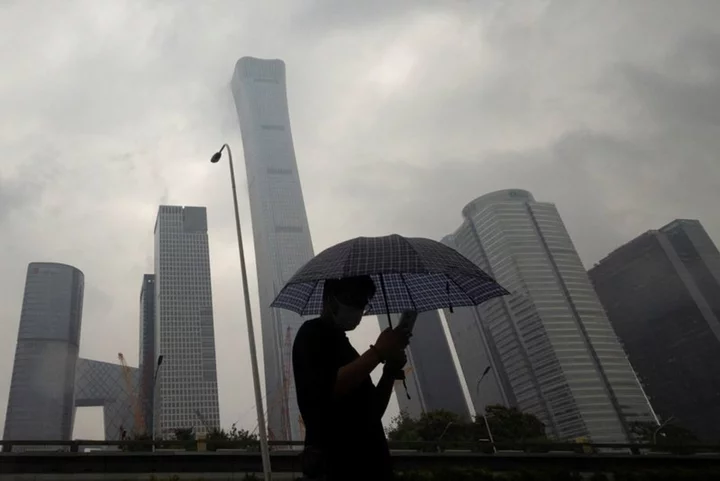By Joe Cash, Ellen Zhang and Kane Wu
BEIJING/HONG KONG U.S. furniture company head Jordan England thinks his firm's Chinese suppliers are among the best in the game, but geopolitics and a slowing economy have pushed him to source more products from Southeast Asia, Eastern Europe and Mexico.
"I'm looking to move away from it (China)," said England, CEO and co-founder of Florida-based Industry West.
"It was always 'China plus one,'" he said, referring to the diversification strategy many businesses began implementing after Washington imposed trade tariffs on Beijing in 2018 to ensure they were not wholly dependent on Chinese suppliers.
Now "it's like 'plus-10' and then China," he added, with the latter down to providing half of Industry West's products and being trimmed more.
Foreign investors have been sour on China for most of this year, but data released over the past month has provided clear evidence of the negative impact de-risking strategies are having on the world's second-largest economy.
Activity surveys showed manufacturing unexpectedly contracted in October, while exports accelerated their decline. China recorded its first-ever quarterly deficit in foreign direct investment in July-September, suggesting capital outflow pressure.
Nicholas Lardy, senior researcher at the Peterson Institute for International Economics, said in a note the new data imply that foreign firms are not only declining to reinvest earnings, but are selling existing investments and repatriating funds.
This trend could further weaken the yuan and clip China's economic growth potential, he added.
"In recent years, the scale, proportion and growth rate of foreign investment absorbed by China have all remained at a relatively high level," He Yadong, a Chinese commerce ministry spokesperson, said in response to a question from Reuters.
LONG-TERM PROSPECTS
Businesses have longstanding worries about geopolitics, tightening regulations and a more favourable playing field for state-owned companies. But for the first time in the four decades since China opened up to foreign investments, executives are now also concerned about long-term growth prospects.
A survey released last week by The Conference Board, a think tank, showed more than two-thirds of the CEOs who responded said China's demand has not returned to pre-COVID levels, with 40% expecting a decrease in capital investments in the country over the next six months and a similar proportion expecting to cut jobs.
China is outwardly confident about growth despite a global economic slowdown, with policy advisers favouring a target of about a 5% expansion of gross domestic product in 2024 and the country aiming to double the economy's size by 2035.
But England said he is concerned about how his Chinese suppliers that also produce for the domestic market will cope with the country's severe property market downturn.
"I'm worried about these factories going from 500 workers to 200, to 100," he said.
OPEN FOR BUSINESS?
Premier Li Qiang's overtures declaring China open for business to foreign investors after the pandemic have been greeted with scepticism in some Western boardrooms in light of a broader anti-espionage law, raids on consultancies and due diligence firms and exit bans, trade bodies say.
Li is expected to make a similar call on Tuesday at the country's inaugural China International Supply Chain Expo, which it is expected to use to tout its supply chain advantages.
"Foreign business executives here are eager to continue in China," AmCham President Michael Hart said. "But boards back in the U.S. are wary."
European firms have raised fair competition concerns about state-directed lending to Chinese manufacturers, while Noah Fraser, managing director of the Canada China Business Council, said "bad blood" remains over the detention of two Canadians from 2018 to 2021.
In private equity, while Asia-focused funds have allocated capital to China, data from Preqin shows that as of Nov. 24, no China-focused buyout fund had been raised in 2023 in any currency, compared with $210 million in 2022 and $13.2 billion in 2019, before the pandemic.
Primavera Capital founder Fred Hu cites mounting macroeconomic uncertainty, a "murky capital market outlook," and lingering concerns over past regulatory crackdowns on high-growth industries such as technology and education.
"Tech firms and other private enterprises must be able to tap public markets for financing and liquidity, so the current market conditions in China do considerable harm to the real economy," said Hu, adding China-focused private equity firms were diverting capital to Southeast Asia, Australia and Europe.
Despite the challenges, foreign investment flows are not unidirectional. Many firms, especially in the retail sector, still target China's giant market. McDonald's said last week it had struck a deal to boost its stake in its China business.
An executive at a European hotel chain, who spoke on condition of anonymity due to the topic's sensitivity, said his firm was happy to reinvest profits in China for now.
"We know what's going on politically and yes, economically," he said, adding the latest data "was nothing to be proud of."
"It's slow, but only warrants taking a 'wait and see approach.'"
(Reporting by Joe Cash and Ellen Zhang in Beijing and Kane Wu in Hong Kong; Additional reporting by Eduardo Baptista and Don Durfee in Beijing; Graphics by Kripa Jayaram; Writing by Marius Zaharia; Editing by Jamie Freed)









